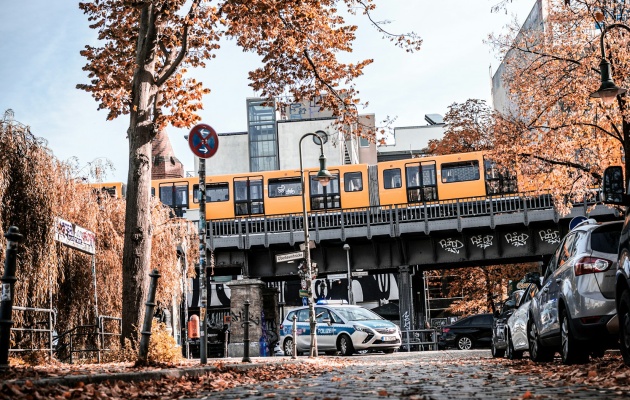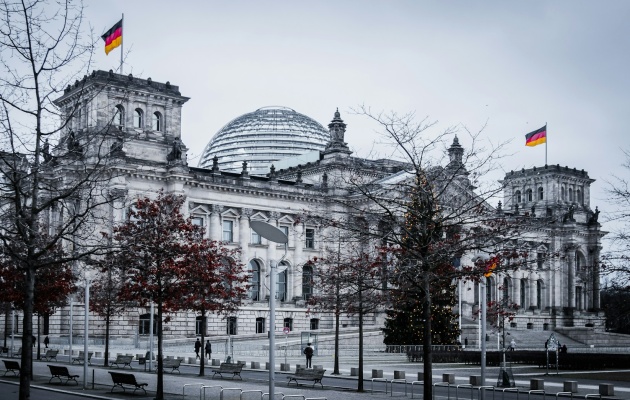“I really believe we need to learn to be better at disagreeing”
Ahead of February's elections in Germany, Frank Heinrich of the Evangelical Alliance explains to Evangelical Focus why a Christian vision introduces nuance into the overall tension and uncertainty.
BERLIN · 21 JANUARY 2025 · 12:31 CET
Cropped.jpg)
European uncertainty about the future is clearly visible also in Germany, where on 23 February the population is likely to vote for a political change.
But Frank Heinrich, co-leader of the German Evangelical Alliance (EAD), believes that part of the prevailing sense of pessimism in the country has to do with poor communication - in politics but also in conversations between ordinary people, including Christians.
Heinrich, who has a 12-year political career as a member of the national parliament (the Bundestag, from 2009 to 2021) with the Christian Democratic Union (CDU), shared his feelings ahead of the national election in an interview with Evangelical Focus.

A view of Berlin, Germany. / Photo: D. Frixou, CC0. Question. A recent survey shows that immigration has become the main problem for Germans shortly before the elections. What factors have caused this increase in recent weeks?
Answer. A Christmas market attack happened in December and earlier in August the stabbings in Solingen happened as well.
Immigration has been a rising topic since 2015 in Germany. The issue has been taken up especially by the AfD [Alternative for Germany, a rising far-right party] but other parties as well. A former president of Germany even said at some point that “Islam belongs to Germany”.
The whole thought pattern of “foreigners are taking over” seems to be one of a few key issues of the election campaign – another is the economy.
I think the issue of security related to people from outside of Germany is not as big as some people make it. And from a societal point of view, immigration and economy are interconnected. For instance, if we threw out of Germany all the people who came after 2015 and are now working, we would have new economic problems with our working force and in the social assistance, like pensions.
Question. Germans express a high level of dissatisfaction with all politicians and a real concern about the economy. Statistics also show that fear of crime is on the rise, and then there is the war in Ukraine. There seems to be a general feeling of uncertainty among the population. A few weeks ago, you said that Germany has a democratic stability that it must not lose. What exactly did you mean by that?
Answer. In 20 or 30 years, things have changed. Back then, there were three parties in the federal parliament but now seven parties makes it harder to form coalitions. This seems to make people insecure because they do not know what they will really get in the end.
And then there is a communication problem. I the last six or seven legislations, I think in average the governments implemented 90% of what they had in their coalition agreements. People would be surprised at this, but this even happened in the three years of this last coalition government, they did quite a lot of what they promised. Of course, in a coalition you cannot do everything because compromise is the business. But the parties are not communicating these realities well enough to the people.
And it is also true that we all want to hear the negative news more than the positive – some say it is 7 to 1 that we prefer the negatives. The news cycle and the criticism on social media accelerates these perceptions. And we Christians are not much better.
So, there are people who abstain from voting, which I feel is a slap in the face for those who have created our democracy, who fought for it. And it is also a slap in the face for people in countries elsewhere (Africa, for instance) who walk for a day or more and make sacrifices to be able to use their freedom of vote.
Finally, there is a sense of insecurity because we are not doing better as a society than five years ago. And this makes people criticise other parts of our democratic system, not only the elected politicians. Voting is not the only part of our democracy.

The Reichstag building, in Berlin. Photo: Cmphoto, CC0. Question. The German Evangelical Alliance has been presenting the positions and ideas of churches to parliamentarians. What social issues or values have taken centre stage for you in these discussions recently?
Answer. Personally, my topic was human trafficking. Especially what happens in Germany in the prostitution area. We got a little further, the Evangelical Alliance was with me on that, since already when the Alliance was founded in the 19th century, one of the topical roots was fighting slavery. We have done conferences and seminars on this issue.
Another issue is religious freedom, strongly rooted in the EAD as well. I had a press conference a few weeks ago right here in this office from which I am speaking now. We had the speaker on religious freedom and belief (FoRB) of the German government sitting with us, and the International Society for Human Rights. We have visited meetings in the parliament on religious freedom and we have been invited by the government for a ministerial conference on religious freedom.
“We should find roundtable-like situations where everything can be said. And where we promise each other not to take it out of the room”
Then, there is the issues of suicide and abortion. In 2017, the parliament passed laws in the last session before the election… I hope something similar will not happen this time with the abortion law.
Finally, Israel and the war there has also an impact on our Evangelical Alliance daily work as well.
Question. Elon Musk, a key figure in Donald Trump’s new executive in the US, sparked a controversy by clearly supporting the far-right candidate Alice Weidel. Is there still a debate among German Christians about whether the AFD’s proposals are “Christian” or “anti-Christian”? How could these difficult conversations among Christians be conducted in a non-polarising way?
Answer. I’ve been much involved in the United Prayer Week of the Evangelical Alliance last week. I spoke at several gatherings, and after the second one, somebody walked up to me who was obviously favouring the AfD and started to discuss. And I realised we do not need to stop these discussions from happening.
But we need to have a good idea of “how” to discuss. Of course, we need to know “what” we are talking about, but the main point for me is the “how”.
We should find roundtable-like situations where everything can be said. And where we promise each other not to take it out of the room. We should have rules for the communication on difficult topics.
I really believe we need to learn to be better at disagreeing. Not dragging the other person down into the mud because they voted for this party or another one. And we shouldn’t think we know everything. We should sentences starting with “I believe…” and not “It is like this”.
“Many in the AfD speak about traditional family but their leader, Alice Weidel, is publicly in a gay partnership”
Does the AfD represent family values? Well, let’s look at the numbers. The lowest percentage of believers in the German parliament is in The Left party, but the second lowest is in the AfD.
It can be favourable to have “conservative” slogans in a campaign (and for some, conservatism equates Christianity) but then not believing in them. Many in the AfD speak about traditional family but their leader, Alice Weidel is publicly in a gay partnership. I’m not against her being gay, but how do you bring those two things together?
Or if you look at the “yellow and red cards” in parliament, as I call them [a comparison with football]. In the last 7 years, as many yellow and red cards were given to the AfD parliamentarians as to the whole rest of parliament. “They made us the enemies”, they could say for two or three years… but that is no longer a justification after seven years in Parliament.
The way of doing politics of the AfD is not the way of the values they promote. And this should discussed as well.
Join us to make EF sustainable
Learn all about our #OneMoreYearEF campaign here (English).
Published in: Evangelical Focus - europe - “I really believe we need to learn to be better at disagreeing”
